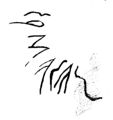VB·1: Difference between revisions
No edit summary |
No edit summary |
||
| Line 31: | Line 31: | ||
First published in {{bib|Bianchetti 1895}}: 69 (no. 17), 117. Examined for LexLep on 20<sup>th</sup> April 2024. | First published in {{bib|Bianchetti 1895}}: 69 (no. 17), 117. Examined for LexLep on 20<sup>th</sup> April 2024. | ||
Images in {{bib|Tibiletti Bruno 1966}}: 4 (detail photo) and 5 (drawing), {{bib|Morandi 1999}}: 169 (drawing) and {{bib|Morandi 2004}}: 548, fig. 11.45 (drawing). | Images in {{bib|Tibiletti Bruno 1966}}: 4 (detail photo) and 5 (drawing), {{bib|Piana Agostinetti 1972}}: 65 and tav. XXXI.9 (drawings), {{bib|Morandi 1999}}: 169 (drawing) and {{bib|Morandi 2004}}: 548, fig. 11.45 (drawing). | ||
Inscribed in rather scraggly letters on the shoulder of the flask (length 5.7 cm); the bars of alpha are irregularly prolonged as in alpha as in [[VB·2]]. The surface is damaged right before the first letter, leading to variant readings {{w||sasamos}} (117) and ''uasamos'' (69, preferred 309) in Bianchetti; {{bib|Kretschmer 1905}}: 98, no. 17, 103, and {{bib|Rhŷs 1913}}: 60 f., no. 17, have ''uasamos'', connected by the latter with the base {{m||u̯ađ-}} 'servant'. {{bib|Rhŷs 1914}}: 26 prefers {{w||sasamos}}, but Whatmough {{bib|PID}} 305 reverts to ''uasamos'' (also {{bib|Pisani 1964}}: 284, no. 120). As already observed by {{bib|Tibiletti Bruno 1966}}: 8 (with discussion of the letter forms 6–8, see also {{bib|Tibiletti Bruno 1968c}}: 356, {{bib|Tibiletti Bruno 1975}}: 49, {{bib|Morandi 1999}}: 169, no. 13), the remaining part of the letter is not a straight line, but clearly curved, confirming sigma – probably with four bars as in the other two instances. Mu is Latin (cf. [[VB·3.1]] and [[NO·18]]). | Inscribed in rather scraggly letters on the shoulder of the flask (length 5.7 cm); the bars of alpha are irregularly prolonged as in alpha as in [[VB·2]]. The surface is damaged right before the first letter, leading to variant readings {{w||sasamos}} (117) and ''uasamos'' (69, preferred 309) in Bianchetti; {{bib|Kretschmer 1905}}: 98, no. 17, 103, and {{bib|Rhŷs 1913}}: 60 f., no. 17, have ''uasamos'', connected by the latter with the base {{m||u̯ađ-}} 'servant'. {{bib|Rhŷs 1914}}: 26 prefers {{w||sasamos}}, but Whatmough {{bib|PID}} 305 reverts to ''uasamos'' (also {{bib|Pisani 1964}}: 284, no. 120). As already observed by {{bib|Tibiletti Bruno 1966}}: 8 (with discussion of the letter forms 6–8, see also {{bib|Tibiletti Bruno 1968c}}: 356, {{bib|Tibiletti Bruno 1975}}: 49, {{bib|Morandi 1999}}: 169, no. 13), the remaining part of the letter is not a straight line, but clearly curved, confirming sigma – probably with four bars as in the other two instances. Mu is Latin (cf. [[VB·3.1]] and [[NO·18]]). | ||
| Line 37: | Line 37: | ||
The sequence {{w||sasamos}} is a personal name in the nominative, either that of the deceased or of a previous owner of the vessel. | The sequence {{w||sasamos}} is a personal name in the nominative, either that of the deceased or of a previous owner of the vessel. | ||
See also | See also {{bib|Piana Agostinetti 1972}}: 272, '''{{bib|Morandi 1999b}}: 302 f., no. 1'''. | ||
<p style="text-align:right;>[[User:Corinna Salomon|Corinna Salomon]]</p> | <p style="text-align:right;>[[User:Corinna Salomon|Corinna Salomon]]</p> | ||
{{bibliography}} | {{bibliography}} | ||
Revision as of 20:56, 1 August 2024
| Inscription | |
|---|---|
| Reading in transliteration: | ṣasamos |
| Reading in original script: | |
|
| |
| Object: | VB·1 Ornavasso (bottle) |
| Position: | shoulder, outside |
| Orientation: | 0° |
| Direction of writing: | sinistroverse |
| Script: | North Italic script (Lepontic alphabet) |
| adapted to: | Latin script |
| Letter height: | 1–1.8 cm0.394 in <br />0.709 in <br /> |
| Number of letters: | 7 |
| Number of words: | 1 |
| Number of lines: | 1 |
| Workmanship: | scratched after firing |
| Condition: | complete, damaged |
|
| |
| Archaeological culture: | La Tène D [from object] |
| Date of inscription: | first half of 1st c. BC [from object] |
|
| |
| Type: | unknown |
| Language: | Celtic |
| Meaning: | 'Sasamos' |
|
| |
| Alternative sigla: | Whatmough 1933 (PID): 305 Tibiletti Bruno 1981: 11 Solinas 1995: 129 Morandi 2004: 45 |
|
| |
| Sources: | Morandi 2004: 547 no. 45 |
Images
Commentary
First published in Bianchetti 1895: 69 (no. 17), 117. Examined for LexLep on 20th April 2024.
Images in Tibiletti Bruno 1966: 4 (detail photo) and 5 (drawing), Piana Agostinetti 1972: 65 and tav. XXXI.9 (drawings), Morandi 1999: 169 (drawing) and Morandi 2004: 548, fig. 11.45 (drawing).
Inscribed in rather scraggly letters on the shoulder of the flask (length 5.7 cm); the bars of alpha are irregularly prolonged as in alpha as in VB·2. The surface is damaged right before the first letter, leading to variant readings sasamos (117) and uasamos (69, preferred 309) in Bianchetti; Kretschmer 1905: 98, no. 17, 103, and Rhŷs 1913: 60 f., no. 17, have uasamos, connected by the latter with the base u̯ađ- 'servant'. Rhŷs 1914: 26 prefers sasamos, but Whatmough PID 305 reverts to uasamos (also Pisani 1964: 284, no. 120). As already observed by Tibiletti Bruno 1966: 8 (with discussion of the letter forms 6–8, see also Tibiletti Bruno 1968c: 356, Tibiletti Bruno 1975: 49, Morandi 1999: 169, no. 13), the remaining part of the letter is not a straight line, but clearly curved, confirming sigma – probably with four bars as in the other two instances. Mu is Latin (cf. VB·3.1 and NO·18).
The sequence sasamos is a personal name in the nominative, either that of the deceased or of a previous owner of the vessel.
See also Piana Agostinetti 1972: 272, Morandi 1999b: 302 f., no. 1.
Bibliography
| Bianchetti 1895 | Enrico Bianchetti, I sepolcreti di Ornavasso [= Atti della Società di Archeologia e Belle Arti della provincia di Torino 6], Torino: Paravia 1895. |
|---|




